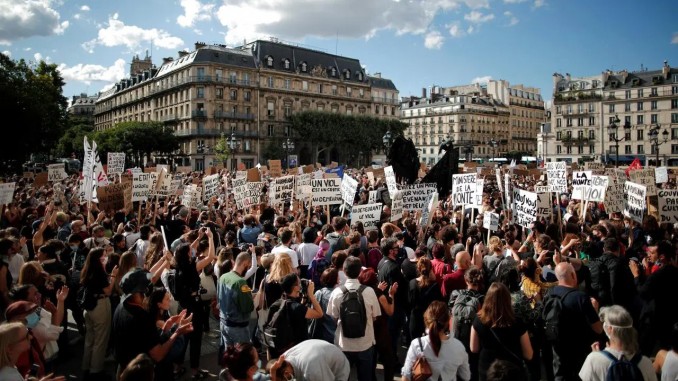
March 1, 2021 – Editorial translated from the French publication, Convergences revolutionnaires, of L’Etincelle
Next Monday, March 8, is International Women’s Day. This year, there is another important reason to support the rallies, demonstrations and strikes: the fallout from the health crisis is only deepening disparities, including the glaring inequality between men and women.
A crisis Hitting Women Harder
The pandemic, of over a year, has plunged people at risk into poverty. Women have been impacted at higher rates: working women often work in less stable jobs, and receive lower wages than men, also retired women, with meager pensions, often cut back by years of unemployment. Women are more economically vulnerable, despite their essential role as “essential workers.” Women are the majority of workers in the tourism industry, one of the hardest hit sectors. Last October, the IMF reported that the pandemic has impacted the world unevenly. A recent survey confirmed that the pandemic affects women and their morale more severely; the pandemic has exacerbated gender inequality in the workplace.
The past year was also marked by restrictions on our freedom of movement, curfews and confinement. The health benefits of these restrictions are questionable, because in France workers still have to pile into public transportation to get to work. Who was in charge of the children’s education when schools were closed? Who was preparing meals when the school cafeteria was closed?
There is data to show how restrictions have led to a considerable increase in violence against women. It is reported that in comparison to 2019, violence against women increased by 36% in the spring of 2020, and 60% in the second lockdown. There are similar reports out of Spain and Brazil.
The Response to the Rise of Reactionary Ideas
Each economic crisis is synonymous with setbacks for fundamental human rights, such as women’s rights and their emancipation. This is the case in Poland, where, at the end of 2020, the ultra-conservative government decided to totally ban abortion. However, this brought hundreds of thousands of people to the streets this fall, and a wave of new demonstrations took place on January 27.
In France, after stonewalling by the Republican parliamentarians, a recent bill aimed at improving abortion rights was withdrawn, while at the same time, the access to appointments at abortion clinics was reduced. Demonstrations against the closure of abortion centers have increased.
#Me Too and the World
Despite restrictions during the pandemic, in Morocco the rape of a five-year-old girl sparked a mobilization. In Nigeria, the rape of a female student, and numerous testimonies from victims, raised a wave of indignation in a country where the law allows men to beat their wives to “correct” them.
Last December 30, in Argentina, tens of thousands of demonstrators marched in the streets with shouts of joy: after years of struggle, a law authorizing abortion was finally imposed.
In France, last July, thousands of people gathered to denounce the appointment of the new ministers Darmanin and Dupond-Moretti, to the cry of “a rapist in the Department of Interior, his accomplice in the Department of Justice.”
All of our victories for women’s rights as well as human rights are constantly at risk. And so, it is still and always necessary to mobilize, to defend equality and fight for new rights on March 8 and beyond, as part of a global movement for a more just and egalitarian society, free of capitalism and patriarchy.




